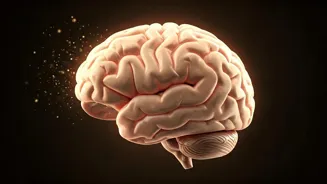Brain Fog Defined
Brain fog isn't a specific medical condition, but rather a cluster of symptoms that affect cognitive functions. It can manifest as mental fatigue, difficulty
concentrating, forgetfulness, and a general sense of mental cloudiness. People experiencing brain fog may struggle with tasks that require focus, like reading or problem-solving. They might also find it hard to recall information or keep track of thoughts. It can impact daily life, making it challenging to work, study, or even engage in simple conversations. The causes of brain fog are diverse, ranging from lifestyle factors to underlying medical conditions. This makes a clear understanding of its symptoms and potential triggers very important. Several factors can make brain fog worse, including sleep deprivation, stress, and certain dietary choices. Recognizing the symptoms and the factors that contribute to brain fog is the first step to managing the condition and improving cognitive performance.
Recognizing Key Symptoms
Identifying brain fog involves recognizing its common symptoms. Difficulty concentrating is a frequent symptom; individuals might find their thoughts wandering or struggle to stay focused on the task. Memory problems are also prevalent, including forgetting appointments, losing track of conversations, or having trouble recalling specific details. Another key symptom is mental fatigue, which is a feeling of exhaustion that makes it difficult to think clearly. Many also report feeling 'spaced out' or having a sense of detachment. Processing information might take longer than usual. For example, someone might take extra time to understand complex instructions or make decisions. Difficulty finding the right words during conversations or when writing can occur. Individuals might also experience mood changes, like increased irritability or anxiety. If you enter a room and forget why you’re there, it is a sign of brain fog. Recognizing multiple of these symptoms is vital for identifying brain fog and seeking appropriate support.
Uncovering Potential Causes
Brain fog can stem from various factors, with some being directly linked to lifestyle choices while others indicate underlying medical conditions. Sleep deprivation is a common contributor. Insufficient sleep impairs cognitive functions and can lead to brain fog. Chronic stress and anxiety also play a significant role; they cause the body to release hormones that impact brain function and cognitive performance. Dietary choices can also trigger brain fog. Food sensitivities, nutrient deficiencies, and imbalanced diets may affect brain health. Certain medical conditions, such as thyroid disorders, anemia, and autoimmune diseases, can lead to brain fog. Furthermore, brain fog can be a side effect of certain medications, like antidepressants and antihistamines. In some cases, brain fog may be related to neurological conditions. It is crucial to examine the causes to identify the possible triggers and determine the best approaches.
Strategies for Management
Fortunately, several methods can help manage and minimize the effects of brain fog. Prioritizing sleep is crucial. Aim for 7–9 hours of quality sleep each night. Stress management techniques are effective; practices such as meditation, yoga, and deep breathing exercises can help reduce stress levels. Maintaining a balanced diet is also essential. Include whole foods and essential nutrients. Staying hydrated is vital for optimal brain function. Regular physical exercise can enhance cognitive performance and reduce brain fog symptoms. Cognitive exercises, such as puzzles or brain-training games, can also help to improve focus and memory. Consulting with a healthcare professional is very important. A doctor can diagnose underlying medical conditions. They can also provide personalized recommendations and support. Making small lifestyle changes can improve cognitive clarity.



















